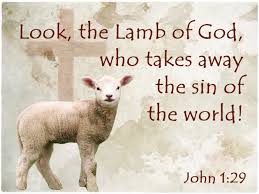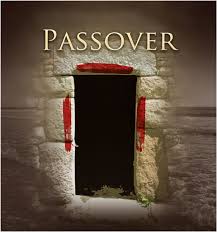The Lamb & The Doorpost
The feast of the Passover signifies the story of God’s 10th attempt to get the Egyptian Pharaoh to release His people. The Israelites were given specific instructions as to what must be done in order to receive their freedom. The importance that the Lord placed upon these instructions was paramount because the very life and future of the Israelites rested upon their obedience to His instructions.
(Exodus chapter 12: 1-8)
1. And the LORD spake unto Moses and Aaron in the land of Egypt, saying,
2. This month shall be unto you the beginning of months: it shall be the first month of the year to you.
3. Speak ye unto all the congregation of Israel, saying, In the tenth day of this month they shall take to them every man a lamb, according to the house of their fathers, a lamb for an house:
4. And if the household be too little for the lamb, let him and his neighbour next unto his house take it according to the number of the souls; every man according to his eating shall make your count for the lamb.
5. Your lamb shall be without blemish, a male of the first year: ye shall take it out from the sheep, or from the goats:
6. And ye shall keep it up until the fourteenth day of the same month: and the whole assembly of the congregation of Israel shall kill it in the evening.
7. And they shall take of the blood, and strike it on the two side posts and on the upper door post of the houses, wherein they shall eat it.
8. And they shall eat the flesh in that night, roast with fire, and unleavened bread; and with bitter herbs they shall eat it.
We are going to break down these verses of Scripture so that we can see the great significance and the importance of the Commandments that God gave to Moses and Aaron.
In verse two it firmly says that the month was to become the very first month, and the first month of the year. But what God was saying is that this time was going to become the beginning of a new life.
In verse three He told them that in the 10th day, (so the days of the month had began to be numbered), that they would take a lamb into their house.
In verse five it shows that the selection of that lamb, the “quality” of that lamb was to be very specific. It had to be perfect as was described, “without blemish.”
In verse six, the instruction was to kill a lamb. Usually, such things were carried out by the senior male within that household. He would be the “father of the household.” Then, in verses seven through eight come the specific instructions as to what to do with the slaughtered animal, its blood and its flesh.
Verses 12 through 14
In these next verses, the Lord explains what is going to happen as He brings judgement down upon the Egyptians.
12. “For I will pass through the land of Egypt this night, and will smite all the firstborn in the land of Egypt, both man and beast; and against all the gods of Egypt I will execute judgment: I am the LORD.
13. And the blood shall be to you for a token upon the houses where ye are: and when I see the blood, I will pass over you, and the plague shall not be upon you to destroy you, when I smite the land of Egypt.
14. And this day shall be unto you for a memorial; and ye shall keep it a feast to the LORD throughout your generations; ye shall keep it a feast by an ordinance for ever.”
In these verses, God foretells the judgment that is going to fall upon those who do not carry out His instructions. He is explaining what will happen to any household which does not carry them out. This Commandment was to all households, including the houses of any Israelite who did not comply.
Now, imagine yourself to be an Israelite family:
The Lord, through these instructions effectively began His calendar giving the day of those instructions as the first day of the first month.
On the 10th day, the instruction was given to choose an unblemished lamb and bring it into your household. Over the next four days, you are instructed to look after it, feed it, and so forth. No doubt, your children would play with it, love on it, and the lamb would respond in a like manner.
Then, sometime during the 14th day, the father, the head of the household, would inform his household that the lamb was to be killed that evening.
Can you imagine how the children would react to that?
Can you imagine what they would say? “But why father, why?” And father would reply, “The lamb has to die so that you can live.”
The father would say to them “The shedding of its blood is for the remission of sins. Its blood has to be spread over the doorposts as a sign that we obeyed the Lord’s instructions. And, then He will pass over our house and no harm shall come upon it.”
Last, of all, the father would tell them that they are to eat the flesh of their little lamb so that its sacrifice was not wasted.
Every year the Israelites were to keep this feast forever to remind them of the day that their freedom began and of the sacrifice that had to be made in order to pay for that. The remission of sins.
The Crucifixion
Prior to His crucifixion, Jesus told His disciples what was going to happen and when it was going to happen. But, it seems like they did not understand what He was saying
“Ye know that after two days is the feast of the Passover, and the Son of man is betrayed to be crucified.” (Matthew 26:2)
Jesus keeps the Passover feast
Now the first day of the feast of unleavened bread the disciples came to Jesus, saying unto him, Where wilt thou that we prepare for thee to eat the Passover? And he said, Go into the city to such a man, and say unto him, The Master saith, My time is at hand; I will keep the Passover at thy house with my disciples. And the disciples did as Jesus had appointed them, and they made ready the Passover. (Matthew 26:17-19)
And as they were eating, Jesus took bread, and blessed it, and brake it, and gave it to the disciples, and said, Take, eat; this is my body. And he took the cup, and gave thanks, and gave it to them, saying, Drink ye all of it; For this is my blood of the new testament, which is shed for many for the remission of sins. (Matthew 26:26–28)
Jesus was reminding them of the original scriptures wherein the lamb was killed, its body was eaten, and its blood was used as proof that had been killed by spreading it over the doorposts so that death would pass over them. He was also trying to explain to them that He was to become the final sacrificial lamb so that, as they continued to obey God’s commandment to keep the feast of the Passover, that it would take on new meaning. That it would remind them of the sacrifice He was making for them.
___________________________
Now, imagine yourself standing at the foot of the cross, looking upon Jesus, then turning to the Father and saying to Him “Why did he have to die?” And the Father turns to you and says….
“He is the Lamb of God – The lamb that had to die so that you can live, forever!”

